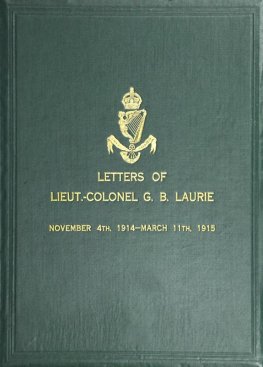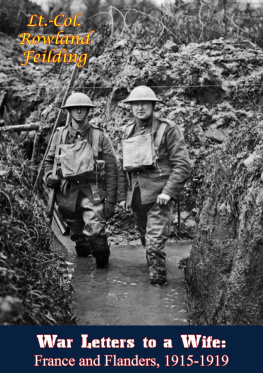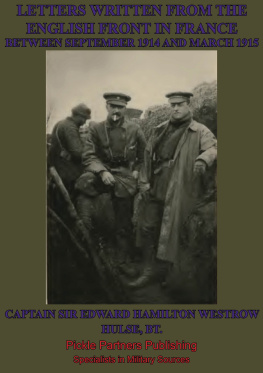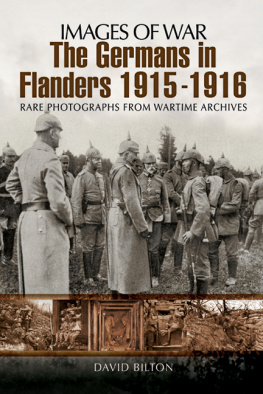To the only Phyllis
First published in Great Britain in 1917 by The Bodley Head
Republished in this format in 2014 by
PEN & SWORD MILITARY
An imprint of
Pen & Sword Books Ltd
47 Church Street
Barnsley, South Yorkshire
S70 2AS
Copyright Richard van Emden, 2014
ISBN 978 1 78159 196 3
A CIP catalogue record for this book
is available from the British Library
All rights reserved. No part of this book may be reproduced or transmitted in any form or by any means, electronic or mechanical including photocopying, recording or by any information storage and retrieval system, without permission from the Publisher in writing.
Printed and bound in England
By CPI Group (UK) Ltd, Croydon, CR0 4YY
Pen & Sword Books Ltd incorporates the Imprints of Aviation, Atlas, Family History, Fiction, Maritime, Military, Discovery, Politics, History, Archaeology, Select, Wharncliffe Local History, Wharncliffe True Crime, Military Classics, Wharncliffe Transport, Leo Cooper, The Praetorian Press, Remember When, Seaforth Publishing and Frontline Publishing
For a complete list of Pen & Sword titles please contact
PEN & SWORD BOOKS LIMITED
47 Church Street, Barnsley, South Yorkshire, S70 2AS, England
E-mail: enquiries@pen-and-sword.co.uk
Website: www.pen-and-sword.co.uk
INTRODUCTION BY RICHARD VAN EMDEN
It is popularly assumed that life in the trenches was a long-drawn-out, miserable saga: unspeakable squalor was the norm, in which men were harried by incompetent generals, run over by rats, infested by lice, and lived knee deep in mud, their lives punctuated by regular bouts of terror and going over the top. The idea that humour had much part to play is near-heresy: the misery of trench life, it is held, guaranteed that there was not much to laugh about and every reason to be morose. In fact, humour was a life-saver, an integral part of service life, its regular expression keeping many men from mental collapse. It is a natural daily humour, often black in character, that under-pins this, one of the outstanding but forgotten books of the Great War. It was published in 1917 as a series of letters from a young officer, Thomas, to his fiance, Phyllis. In fact, the use of these names is the only fictitious element to the book; otherwise the letters are reproduced practically untouched, as the author, real name Cecil Down, says of his writing to Edith, the real name of his fiance.
These letters are important. They are written by a man who possessed not only a special literary gift but also the perseverance to write on a very regular and frequent basis, so that they provide an unfettered snapshot of one soldiers war as it happened. Composed over an eighteen-month period from February 1915 until late July 1916, averaging almost one letter a week, they were written with no thought as to their future publication; it is not known whether or not he even asked Edith to hold on to the letters. The result is a story not reflected upon after the war, nor tampered with by reassessment or altered sentiment. They are impressions of the moment, and are subject to the fits of depression and optimism that attacked everybody in the trenches, he asserted. There are other books of letters, of course, but few, very few, can write as well as Down did; indeed, his distinctive style is a rare gift.
Downs introduction appears modest, even slightly downbeat. This is no thrilling tale of daring-do, he wrote, but a collection of letters written from all kind of places, mostly unpleasant, in all weathers, chiefly rain, and at all sorts of odd times. Yet what he could not say is that they are beautifully written, vibrant and hugely entertaining.
Constitutionally, he is upbeat in outlook; his writing is not indicative of forced cheerfulness in order to safeguard the feelings of Edith, nor are the letters wildly optimistic for fear of appearing to be unpatriotic. Theres no stiff-upper-lip here, but there are nevertheless tangible mood swings, permitting the reader to appreciate the nuances of the authors personality as one might understand in a good friend or close relative. Importantly, we appreciate that a soldiers stated opinion is not necessarily his view set in concrete, but often an immediate and transitory response to events often trivial and even banal. As Down points out, if he asserts that the war might be lost, this may be purely a reaction to the late arrival of the rum ration in the morning when thwarted expectations turn to sullen resentment.
Down writes eloquently of the armys politics. He describes cogently the arrangement by which orders are passed down the chain of command, and how ultimately the man who is praised for the successful completion of a back-breaking job is not, as a rule, the man who has physically undertaken the task, but the one charged with overseeing its implementation. He talks, too, of rest from the front line, which was frequently not rest at all, but an opportunity to keep men on their toes through the necessary but, as he explains, the needlessly aggressive cleaning of equipment, physical exercise, practised skirmishing and endless route marches deemed worthwhile, he claims, owing to the perceived inaction of life in confined trenches. Down is not overtly critical of these decisions, but rather prefers to cast his eye wryly over such rules and regulations, gently mocking their over-zealous interpretation but not their validity nor importance.
Grousing at such rules and regulations was as normal a state of affairs as making light of trying situations. Moans about conditions and daily demands made upon men in the line were directed, as Down says, at the much-maligned army staff. Complaining about the perceived failure or exaggerated demands of superiors gave vent and focus to petty frustrations; it bound men together in the trenches and out on rest, dissipating the inevitable aggression in an all-male environment and directing it at outside nebulous forces.
One of Downs greatest assets is the gift of mimicry. He listened to and captured conversations, the intonation and accents of other ranks and fellow officers, like no other author. He describes incidents with a panache that is not only delightful but surprisingly modern in delivery: his description of a court martial in which a man is accused of shooting a farmers chickens, rings wincingly true of the sometimes amateurish way in which such courts could be conducted, and is so funny that it makes one laugh out loud.
On another occasion, he recalls an incident when, chewing a particularly large piece of toffee sent from home, he received a call from his irascible commanding officer.
[I] tried to say hello but could not open my mouth, he wrote. At the other end I could hear the CO cursing my lack of promptitudethe toffee had me in its grip. In the end Down could offer nothing more than a long drawn out
o-o-o-m.
That you?
o-o-o-m.
Why havent you come before?
o-o-o-m.
Youve been to sleep. Youre half asleep now.
o-o-o-m.
You have, I can hear the sleepiness in your voice, and thereupon he delivered me a lengthy lecture upon the subject of falling asleep at ones post, and the penalties involved, among them death...
While the tone of the letters is buoyant, this did not mean that he shied away from describing incidents of pathos. Sometimes humour is the backdrop to what is clearly a poignant moment, but on other occasions he describes with disarming simplicity and accuracy moments of anguish; of a newly-formed mine crater he wrote:
















